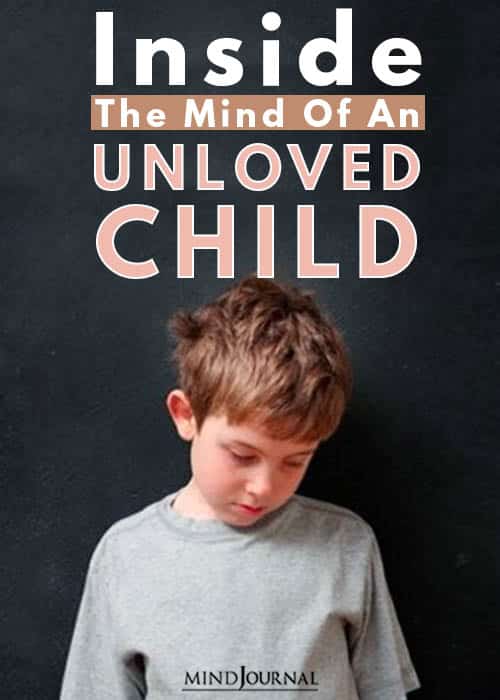Isn’t it weird to wonder if you are the unloved child of your family? When it comes to their children, parents always love them unconditionally and irrevocably, right? Unfortunately, not every child is lucky and fortunate enough to get good, loving parents. Read on to know what is inside the mind of an unloved child.
It is possible to detect an unloved child just by looking at their emotional scars. There is a substantial difference between a child who is loved and accepted and a child who is not.
There may be reasons why a parent doesn’t give the love the child deserves. Such as:
- When the child wasn’t planned, and it was an accidental prergnancy.
- When the child is a representation of a lack of affection between their parents.
The child usually doesn’t tend to understand why they are being treated this way. The unloved child seems to view the world as unfair and they feel like they are all alone and unwanted. This makes the child feel helpless and pushes them to do anything to change their circumstances.
Related: 25 Signs You Have a Wounded Inner Child and How to Heal
Playing the Blame Game
Let’s say the mother says “I am tired of handling them”. A lot of mothers can say this due to stress or maybe they are just having a bad day.
But when there is an unloved child involved, the parent tends to put demands on the child they can’t fulfill. Since there are too many expectations, it makes the child develop more skills than necessary in their developmental stage. And when the child can’t fulfill such expectations, their parents tend to dump their frustrations on the child and treat them as incompetent. The child sees that everything that they do becomes annoying to their parents and nothing is enough for their parents to accept them.
They are often found to always stay quiet, pay attention for long periods of time, or set the table exactly like an adult due to these expectations.
Therefore they tend to develop strong feelings of blame and develop learned defenselessness. They feel that no matter what they do the outcome will always be unappreciated.
11 Signs of an Unloved Child
When the child feels unloved, their heartbreaks. They can’t understand the reason for their suffering or why their parents don’t love them. They tend to develop a lot of fear and anxiety due to the lack of affection and acknowledgment.
Here are some signs that point towards an unloved child:
1. The child develops fears and phobias of objects or situations which the child can’t control.
2. They tend to become very impulsive.
3. Not being able to control their rage or anger.
4. Unable to express their emotions properly.
5. They tend to move rapidly from one task to the next and with time become more unstable.
6. Start showing signs of anxiety.
7. Asking too many questions, not sitting still, or exhibiting repetitive behavior.
8. They try to become invisible to avoid criticism and feelings of disappointment.
9. Uncomfortable being social with other people or children.
10. They become very suspicious and show signs of confusion and discomfort.
11. Being unable to trust anyone.

What do we need to understand?
As humans, we need touch, hugs, and affection. Especially when we are growing up. Receiving criticism and zero affection can make a child feel unloved. As parents, it is essential to understand that no matter if the child was unwanted or if you were not prepared for it, the child must feel welcomed and loved all the same. Emotional affection is an essential need for a child just like eating or sleeping.
If the child doesn’t receive love and affection while growing up, they never learn how to love or even know how love feels. Since they never experienced love, they tend to always struggle with the meaning and feeling of love.
Related: 5 Effects of Growing Up as an Unloved Child and How To Heal
Here are some observations you might want to look out for in case you are an adult who was unloved. They are as follows:
1. Feeling unsatisfied in relationships.
2. Feeling insecure and always questioning your partner’s love.
3. Your partner can never do enough to please you.
4. Feeling left out or excluded often.
5. Being alone or feeling safer in solitude.
6. Feeling vulnerable to share your feelings.
7. Hard time showing or expressing feelings of love.
8. Feeling like something is missing all the time.
9. You tend to be in toxic relationships.
Feeling unloved can be a difficult emotion to deal with and hence it is important to develop good parenting techniques to ensure that your child’s mental health is not affected. Not being loved can make them feel unfulfilled. So how a child turns out ultimately depends on the parents and what values they teach. Make it a priority to compliment your child for their achievements and to display love and affection towards them every day. It is important to not display irritability or negative moods since this may hinder your child’s development.
As a parent, shaping a child’s future is completely in your hands. How you manage your emotions and how you display them determines what they will learn from you.
Related: 4 Steps to Recovery After Childhood Emotional Neglect
As for adults who feel unloved, sometimes it is important to make a choice. So make the choice to learn how to love yourself and be loved. It may require time and patience but you can choose to heal your wounds; give yourself some time and show yourself the same kindness you show others. You can rely on your friends and loved ones for support and understanding, and if needed, also seek professional help. Make peace with your inner demons and move forward with love in your heart.












Leave a Reply